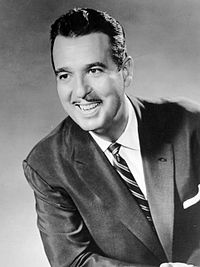
In 1955, Billboard magazine published three charts covering the best-performing country music songs in the United States: Most Played in Juke Boxes, Best Sellers in Stores, and Most Played By Jockeys. The juke box chart was based on a "survey among operators thruout [sic] the country using a high proportion of country and western records", the best sellers chart on a survey of "dealers...with a high volume of country and western records" and the jockeys chart a survey of "top disk jockeys in all key markets".[1] All three charts are considered part of the lineage of the magazine's current country music songs charts.[2]
As in the previous year, the number one position on all three charts was dominated during 1955 by Webb Pierce, the most successful country singer of the mid-1950s.[3] His rendition of "In the Jailhouse Now", an early 20th-century song most associated in the country music field with 1920s country pioneer Jimmie Rodgers,[4][5] spent 21 weeks at number one on the juke box chart beginning in March. This run tied the record held by Eddy Arnold's "I'll Hold You in My Heart (Till I Can Hold You in My Arms)" (1947–48) and Hank Snow's "I'm Moving On" (1950) for the most weeks spent atop one of Billboard's country charts.[6] The three songs would share the record for more than fifty years until Florida Georgia Line spent a 22nd week at number one on the Hot Country Songs listing in 2013 with "Cruise".[6] "In the Jailhouse Now" was also the longest-running chart-topper of 1955 on both the best sellers and jockeys charts, spending 20 weeks and 15 weeks respectively in the top spot. Pierce's grip on the number one position was strongest on the juke box chart, on which he spent 47 weeks at number one, including one week when he tied for the top spot. Carl Smith (four weeks, including one tied with Pierce), Eddy Arnold (two weeks) and Tennessee Ernie Ford (one week) were the only other artists to top that listing in issues of Billboard with a cover date of 1955.
The same four artists were also the only ones to top the best sellers chart, but three other acts reached number one on the jockeys chart, including two who achieved their first chart-toppers in 1955. Faron Young reached number one for the first time in June with "Live Fast, Love Hard, Die Young", which spent three weeks topping the listing.[7] The song was replaced in the top spot by "A Satisfied Mind" by Porter Wagoner, which was similarly the first appearance at number one for the singer.[8] The third artist to top only the jockeys chart was Hank Snow, who reached number one on the airplay-based listing with "Let Me Go, Lover!" The final number one of the year on both the juke box and best sellers charts was Tennessee Ernie Ford's "Sixteen Tons", which also crossed over to top the magazine's pop charts.[9] The last jockeys chart of 1955 had Pierce at number one with "Love, Love, Love".
- ^ Cite error: The named reference
Jan 1was invoked but never defined (see the help page). - ^ Whitburn, Joel (2005). Joel Whitburn's Top Country Songs: 1944-2005. Record Research. p. ix. ISBN 9780898201659.
- ^ Erlewine, Stephen Thomas. "Webb Pierce Biography & History". AllMusic. Archived from the original on September 10, 2018. Retrieved September 9, 2018.
- ^ George-Warren, Holly (2007). Public Cowboy No. 1: The Life and Times of Gene Autry. Oxford University Press. ISBN 9780199884292.
- ^ Davis, Mary; Zanes, Warren (2009). Waiting for a Train: Jimmie Rodgers's America. Rounder Books. ISBN 9781579401238.
- ^ a b Whitaker, Sterling (August 1, 2013). "Florida Georgia Line set all-time chart record with 'Cruise'". The Boot. Townsquare Media. Archived from the original on January 2, 2021. Retrieved May 11, 2018.
- ^ Erlewine, Stephen Thomas. "Faron Young Biography & History". AllMusic. Archived from the original on September 18, 2018. Retrieved September 18, 2018.
- ^ Willman, Chris (October 29, 2007). "Porter Wagoner, 1927-2007". Entertainment Weekly. Archived from the original on September 18, 2018. Retrieved September 18, 2018.
- ^ Collins, Ace (1996). The Stories Behind Country Music's All-time Greatest: 100 Songs. Berkeley Publishing Group. pp. 91–93. ISBN 9781572970724.